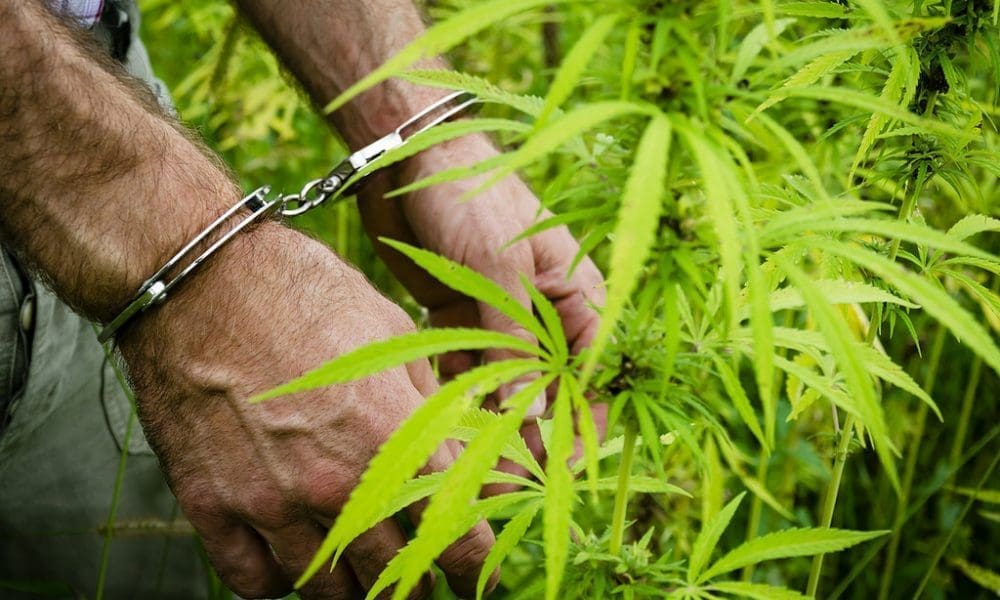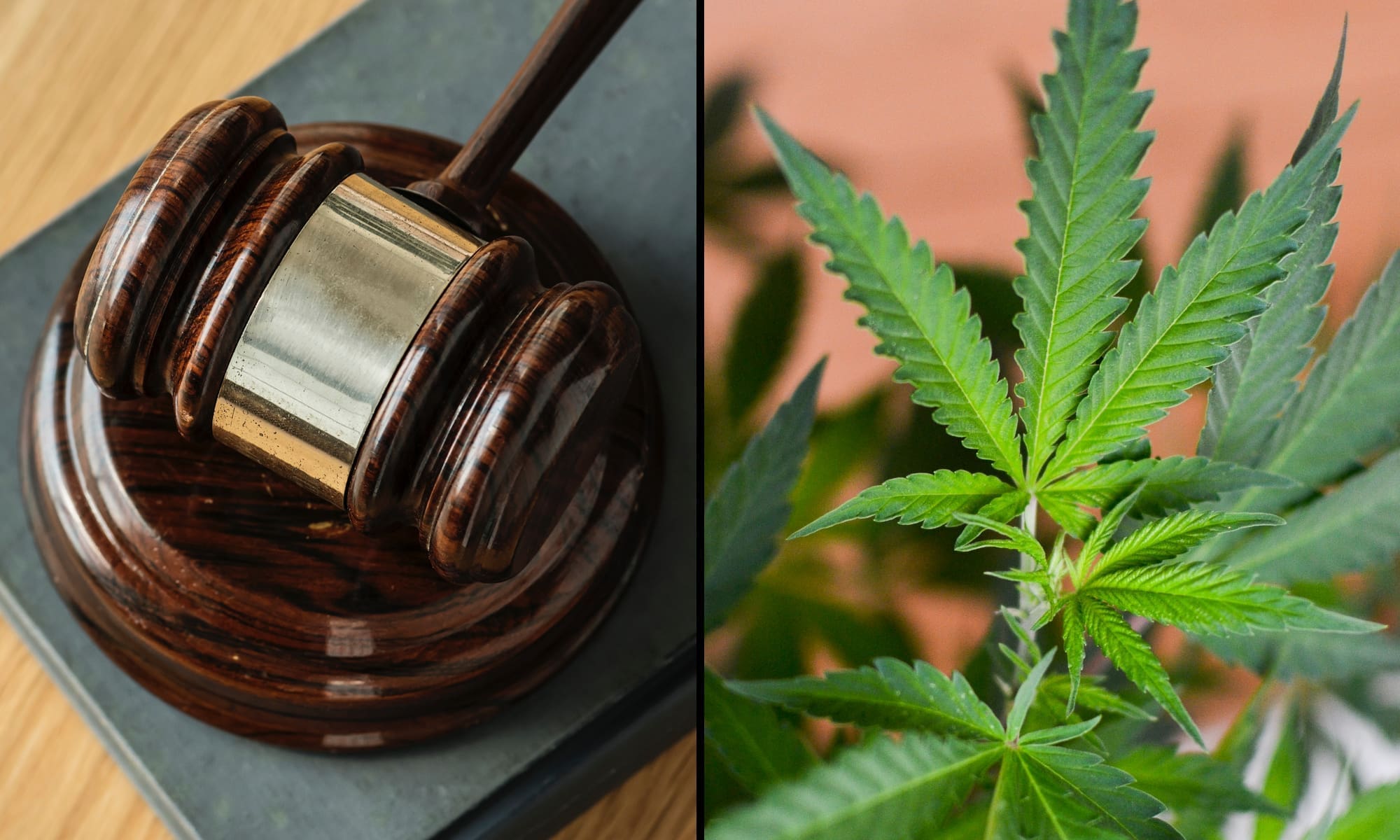featured
DEA Releases New Data On Marijuana Enforcement, Tracking ‘Chinese Grows’ For The First Time
Published
2 weeks agoon

Enforcement efforts against illicit cannabis operations by the U.S. Drug Enforcement Administration (DEA) held mostly steady in 2024 compared to previous years, according to newly released agency data that, for the first time, also tallies actions against what DEA calls “Chinese Grows.”
The new report from DEA’s Domestic Cannabis Eradication / Suppression Program includes numbers of “eradicated” grow sites, arrests and weapons seized in association with marijuana-related enforcement actions, as well as the DEA-estimated market value of seized cannabis products.
Though data from some states is not included in the latest report, the DEA program nationwide counted 16,330 cultivation sites eradicated in 2024, including 14,904 outdoor sites and 1,426 indoor ones. A reported 5.3 million plants were seized.
As a result of the actions, 5,764 arrests were made, and 3,125 weapons were seized, the report says.
In general, the 2024 numbers are considerably lower than a decade ago, before many states had legalized and regulated marijuana for adults or medical patients, providing consumers with legal and regulated means to access cannabis and reducing illicit market demand. But they’re otherwise largely in keeping with actions from recent years.
On that note, however, DEA has come under fire in the past for its failure to promptly or completely release data from its eradication program. Last December, critics pointed out that the agency hadn’t released new data in more than a year and a half, since May 2023.
Although DEA recently posted the new 2024 data, it also appears to have removed a statistical report from 2022 that had already been published. And a 2023 report includes entries of “0” for enforcement in a number of states, indicating either missing data or a lack of enforcement actions whatsoever.
DEA didn’t immediately respond to Marijuana Moment’s requests for comment.
Paul Armentano, deputy director of the advocacy group NORML, called it “troubling” that the agency hasn’t provided more robust data.
“The DEA’s failure to release this data in a timely manner, coupled with its failure to release complete data for the years 2022 and 2023, once again highlights the federal government’s lack of transparency when it comes to providing accurate statistics on the estimated costs and scope of federal marijuana prohibition in America,” he said. “At a time when voters and their elected officials nationwide are re-evaluating state and federal marijuana policies, it is troubling that these agencies are providing far less than a complete picture regarding the true costs and impact of maintaining cannabis criminalization in America.”
The recently released report, about enforcement actions from last year, for the first time includes a separate column labeled “Chinese Grows”—illegal cannabis operations that officials and media reports say have become increasingly common in the U.S. in recent years.
In all of 2024, 15 Chinese cultivation operations were the targets of enforcement actions, the DEA data show, most of them in Washington State (five) and Oregon (four).
That’s just a sliver of the overall illicit cannabis actions nationwide, Armentano at NORML pointed out.
“Out of the tens of thousands of grow operations seized in 2024, federal agencies only identified Chinese involvement in 15 of them,” he said in an email to Marijuana Moment. “This total would appear to undermine claims that Chinese drug traffickers are rampantly involved in these domestic operations.”
Armentano added that “it also begs the question why Chinese operators are being singled out as opposed to the involvement of other international [drug trafficking organizations].”
For decades, for example, Mexican cartels were involved in illegal cannabis cultivation in parts of California, but DEA didn’t separate out those groups in past reports.
Notably, the most recent DEA statistical report does not include any information whatsoever on some states, such as Maine, which news reports last year described as “the newest frontier for the illicit marijuana trade,” especially for Chinese-involved operations. It’s possible the missing data would show significantly more enforcement actions nationally.
The Department of Justice (DOJ) in past weeks charged seven Chinese nationals with illegal marijuana activity in Maine and Massachusetts, for instance, though those actions are too recent to be reflected in the new DEA report.
Separate data from last May, released by U.S. Customs and Border Protection (CBP), indicated that seizures of cannabis at southern border declined again in 2023.
Those figures showed that federal agents intercepted roughly 61,000 pounds of cannabis in the region—a 29 percent drop from the year before.
Those findings track with other indications of declines in illegal marijuana trafficking as a growing number of state laws gave American consumers legal places to buy cannabis, including a report from the U.S. Sentencing Commission in March of last year showing federal cases continuing to fall.
While that report didn’t cite the specific number of marijuana trafficking cases in 2023, it dipped again compared to the previous 2022 low of 806. By comparison, there were roughly 5,000 cannabis cases in 2013.
A 2022 report from the Government Accountability Office (GAO) shed some light on who’s getting caught up in enforcement activities. At checkpoints across the country, agents are mostly taking small amounts of marijuana from American citizens rather than making large busts of international cartels, as some might assume.
Also, consistent with other studies and federal reports, the GAO analysis showed a significant decline in cannabis seizures at checkpoints overall since 2016.
While DEA hasn’t updated its DCE/SP data, the agency has been involved in another area of marijuana policy: It’s actively participating in an administrative hearing on the Biden administration’s proposal to reschedule cannabis. However, the DEA judge assigned to that case has been critical of the agency throughout the processdue to largely procedural missteps.
Separately, just days after the Senate confirmed a new DEA administrator appointed by President Trump, the agency promoted yet another message warning against marijuana use, linking it to depression and suicidal thinking.
While DEA has been promoting a variety of anti-cannabis campaigns and editorials, this latest feature comes at a notable time, following the Senate confirmation and swearing in of Terrance Cole to serve as the agency’s administrator. Advocates and stakeholders are monitoring closely to see how DEA navigates both the policy and messaging around cannabis with Cole’s confirmation.
Cole indicated during his confirmation process that he planned to prioritize marijuana rescheduling, without giving his specific opinion about the reform. But that was not reflected in a statement issued following his taking office, with cannabis policy going unmentioned as part of a list of immediate policy priorities.
So far during the Trump administration it seems the agency isn’t giving up on its ancillary anti-marijuana promotions. For example, last week DEA marked “World Emoji Day” by again promoting its guide to “decode” symbols that it claims are associated with illegal drug use and sales.
Also, during “National Prevention Week” in May, DEA highlighted a campaign that encourages people to share memes with dubious claims about the effects of cannabis—including the theory that it is a “gateway drug” to using other substances.
The “Just Say Know” campaign wasn’t directly organized by DEA; rather, it was coordinated by the organization Johnny’s Ambassadors, which was founded parents who say their child died by suicide after consuming high-potency marijuana concentrates. But the federal agency hosted the memes on two of its taxpayer-funded websites and sent email blasts to promote them.
In 2023, DEA also advised young people that, rather than doing drugs, they should focus on becoming Instagram influencers. The agency promoted tips on how to get a “natural high” as an alternative to drugs, sharing what it said were “7 Better Highs” such as becoming famous on Instagram, playing video games and going to a pet store to look at animals.

Author: mscannabiz.com
MScannaBIZ for all you Mississippi Cannabis News and Information.
You may like
-


12 New York Cannabis Businesses Sue State Over School Proximity Fiasco
-


Massachusetts Auditor Notes ‘Violations’ and ‘Mismanagement’ At Cannabis Control Commission
-


Supreme Court Gives Marijuana Companies More Time To File Petition In Case Challenging Federal Prohibition
-


Canopy USA Appoints New Executive Team to Accelerate Growth
-


Washington Adult-Use Cannabis Sales Decline for Fifth Straight Year
-


Delaware Governor Seeks Marijuana Regulation Advice From Colorado Counterpart As State’s Legal Market Launches
featured
12 New York Cannabis Businesses Sue State Over School Proximity Fiasco
Published
60 minutes agoon
August 18, 2025
A dozen New York-licensed cannabis dispensaries are taking regulators to court over a screw-up by the state’s Office of Cannabis Management (OCM) related to their storefront locations being too close to schools.
The 12 petitioners filed the complaint on Aug. 15 in the New York Supreme Court in Albany County, against the OCM and the state’s Cannabis Control Board (CCB) over a school proximity correction that the office issued July 28. The correction, which impacts 108 dispensary licensees and 44 applicants with provisional licenses, intends to realign the OCM’s 500-foot measurement guidelines with state law.
Instead of continuing an entrance-to-entrance measurement between dispensaries and schools from the OCM’s erroneous 2022 guidance, the office now plans to measure the buffer zone from the entrance of a cannabis store in a straight line to the nearest property line boundary of a school’s grounds to move into compliance with New York’s cannabis law.
Following the proximity correction issuance, OCM Acting Executive Director Felicia A.B. Reid sent a letter on Aug. 6 to the 152 impacted businesses, clarifying that the 108 licensees may remain open or continue to work toward opening in their current locations as state officials push lawmakers for a legislative fix to grandfather in their locations. The 44 applicants, meanwhile, will need to move locations and will have access to $250,000 each from a $15 million relief fund to lessen their burdens.
Despite the assurance that the 108 licensees can remain put—and even continue to operate while the OCM delays reviewing any license renewals pending the legislative fix—the petitioners are asking the state Supreme Court in Albany to annul the OCM’s revised interpretation of Cannabis Law § 72(6) and declare that their locations remain compliant under a lawful reading of that law as well as the OCM’s 2022 guidance.
The 12 cannabis businesses are also asking that a State Supreme Court judge issue a preliminary and permanent injunction preventing the OCM from taking any enforcement actions against them based on the office’s new interpretation of the law, forcing the OCM to instead keep its previous interpretation that regulators used to review and approve site plans to issue licenses.
“Relying on those approvals, petitioners poured their life savings into launching their businesses,” the complaint states. “They signed leases, completed build-outs, hired employees and opened their doors to the public under the state’s very detailed framework. But now, in a complete about-face, OCM incredulously claims it got the law wrong all along.”
Furthermore, the petitioners claim that the OCM changed its guidance based on a new interpretation of the law without any formal rulemaking process or public notice. They argue that the informal rulemaking violates the State Administrative Procedure Act and that state officials arbitrarily redefined their own regulations.
Seven of the 12 businesses suing the state are either open or have received their final licensure to open, meaning the state has assured them they do not need to move locations and can remain open even with expired licenses—the OCM indicated it cannot approve their license renewals until state lawmakers act. However, some businesses fear that insurance companies and banks may refuse to service them if their licenses have expired, even in an interim phase.
“Petitioners face numerous collateral consequences as a result of OCM’s unlawful reinterpretation of Cannabis Law §72(6),” the complaint states. “Specifically, petitioners are required as part of their leases to be in compliance with all cannabis laws. OCM’s arbitrary and capricious actions have placed them at risk of falling into material breach with their lessors and, if allowed to continue, will cause them irreparable harm.”
These seven businesses include: ConBud (Manhattan), The Cannabis Place (Queens), Summit Canna (Bronx), Hush (Bronx), High Fade (Manhattan), Housing Works Cannabis Co. (Manhattan) and Common Courtesy Dispensary (Queens).
Meanwhile, the other five petitioners in the lawsuit are cannabis business applicants who received provisional licenses that are not yet finalized and will therefore be forced to pack up and change locations. These businesses include: Rezidue, Elise Pelka, Toastree, Monarch NYC and Luxe Leaf Boutique.
According to the lawsuit, while each of the five applicants has incurred significant buildout expenses, Rezidue, Elisa Pelka and Lux Leaf Boutique have completed their buildouts and were ready to begin operating upon a virtual inspection and gaining final licensure.
The petitioners’ construction costs ranged from $500,000 to $1,000,000, falling short of the $250,000 available per applicant in the state’s relief fund, according to the lawsuit.
“Petitioners have each expended nearly and in some cases over $1 million in preoperational expenses, and several million dollars each in post-operational expenses in reliance of OCM’s assurances,” the complaint states. “If OCM’s new and unlawful interpretation is allowed to remain in force, petitioners will also lose hundreds of thousands of dollars in deposits and lease termination penalties that cannot be recouped.
“Additionally, petitioners have all executed personal guarantees on their commercial leases, which would not only bankrupt the businesses, but also the individuals who guaranteed these leases.”
The petitioners argue that these expenses represent irreparable harm, which the court has the authority to prevent.
Other arguments the 12 cannabis businesses made in the lawsuit include:
- Retroactively revoking their license rights without notice or hearing violates due process;
- The OCM violated the equal protection clause of the state’s Constitution by revoking their proximity protections and thereby allowing competing applicants to gain favorable locations (in addition to the 500-foot school buffer zone, dispensaries must adhere to bigger buffer zones between other dispensaries).
- By pre-emptively denying licensees renewals, the OCM has engaged in unlawful “taking” without affording the petitioners due process of the law by way of a fair hearing;
- The plaintiffs’ investments have been rendered valueless by the OCM’s retroactive policy change, amounting to a “regulatory taking” under the New York Constitution; and
- The OCM’s new interpretation of the state’s cannabis law as it relates to school proximity requirements disproportionately harms those who were already disproportionately harmed by the drug war, which violates the state’s Marihuana Taxation and Regulation Act (MRTA) provisions to prioritize the inclusion, participation and sustainability of equity applicants.
“OCM’s reinterpreted rule disproportionately harms these stakeholders and licensees and undermines the very purpose of this law,” the complaint states about the latter bullet point. “Petitioners do not come from generational wealth and therefore cannot sustain such a hit. Their lives would be shattered while the OCM simply says ‘I’m sorry.’”
In particular, 11 of the plaintiffs are conditional adult-use retail dispensary (CAURD) licensees who were prioritized by the state because their businesses were owned by justice-involved individuals who reside in New York.
The 12th plaintiff is a social and economic equity (SEE) licensee, a category reserved for justice-involved individuals, minority- or women-owned businesses, distressed farmers, or service-disabled veteran-owned businesses.
“Petitioners would experience harm unlike anything they have faced before and would be relegated to levels of crippling debt, the likes of which they could never escape,” the complaint states. “The purpose of the MRTA was to undo these past injustices, not to exacerbate them.”

Author: mscannabiz.com
MScannaBIZ for all you Mississippi Cannabis News and Information.
featured
Massachusetts Auditor Notes ‘Violations’ and ‘Mismanagement’ At Cannabis Control Commission
Published
2 hours agoon
August 18, 2025
Massachusetts Auditor Diana DiZoglio last week released an audit of the state’s Cannabis Control Commission (CCC), claiming to have uncovered violations and mismanagement issues at the commission, NBC Boston reports.
The audit found that officials “failed to take appropriate steps and institute procedures” to guarantee the administering of cannabis industry license extensions, and that a “lack of supervision and minimal accountability over licensing staff members” helped contribute to the breakdown.
“CCC’s mismanagement of prorated fees for license extensions resulted in procedural inequity, revenue loss, and noncompliance with state regulations.” — Excerpt from the audit summary
The commission said it has “been working closely with the State Auditor’s Office for almost a year and will review the report released today in furtherance of our shared commitment to government improvement. Over the course of the audit period and since, the Commission has hired key leaders, made progress to address many of the issues referenced, and begun to move forward in a constructive way.”
The report was released hours after the commission voted unanimously to reinstate the license of Assured Testing, a testing lab accused of failing to report thousands of contaminated cannabis samples, the report said. The commission issued penalties against the lab, including a $300,000 fine and two years of probation. Additionally, the lab — which has publicly disagreed with the findings but says it will honor the commission’s terms for reinstatement — will have to hire an independent auditor, an internal control manager, and a new interim CEO.
“We are eager to return to what we do best: delivering scientific, evidence-backed testing with industry-leading cannabis expertise,” Assured Testing said in a statement.

Author: mscannabiz.com
MScannaBIZ for all you Mississippi Cannabis News and Information.
featured
Supreme Court Gives Marijuana Companies More Time To File Petition In Case Challenging Federal Prohibition
Published
3 hours agoon
August 18, 2025
The U.S. Supreme Court has granted a request to give marijuana companies suing the Justice Department in an effort to overturn federal prohibition two more months to file their petition with the justices.
Lawyers for the cannabis firms said the extension was needed due to the “significant and complex constitutional issues” that are being raised in the case, as well as the fact that state governments and other experts who plan to file support briefs need more time to “carefully craft their arguments.”
The prominent litigation firm Boies Schiller Flexner LLP that’s representing the companies—Canna Provisions, Gyasi Sellers, Wiseacre Farm and Verano Holdings—entered a request for a 60-day extension to submit its writ of certiorari last week. Justice Ketanji Brown Jackson approved the proposal on Friday, pushing back the current deadline of August 25 to October 24.
The companies’ request noted that counsel for the Office of the Solicitor General don’t oppose the extension.
The brief gave three reasons for the request: 1) the lead attorney on the case, David Boies, is “heavily engaged in previously scheduled matters” before other federal courts, 2) several experts who expressed interest in supporting their lawsuit with amicus briefs have said they need more time and 3) the case involves complex legal issues that require more in-depth consideration.
“This case presents significant and complex constitutional issues concerning both state-regulated marijuana specifically and the authority of Congress to regulate purely intrastate commerce generally,” the filing says. “The additional time will permit counsel to prepare a petition that appropriately addresses the questions of nationwide importance raised by this case.”
That includes “the question of whether [Gonzales v. Raich] was correctly decided,” it says, referencing a landmark 2005 Supreme Court ruling, wherein justices narrowly determined that the federal government could enforce prohibition against cannabis cultivation that took place wholly within California based on Congress’s authority to regulate interstate commerce.
With respect to future amicus briefs the applicants are expecting, they said “counsel have heard from law professors, non-profits, state governments, and others interested in submitting amicus briefs in these proceedings, and several of these potential amici have expressed concern about having sufficient time to prepare over the summer.”
“An extension will provide potential amici adequate time to consider the case and carefully craft their arguments,” the filing says.
This comes about three months after a U.S. appeals court rejected the arguments of the state-legal cannabis companies, one the latest blow to the high-profile lawsuit following a lower court’s dismissal of the claims. But it’s widely understood that the plaintiffs’ legal team has long intended the matter to end up before the nine justices.
“It’s fair to assume that we shall seek Supreme Court review,” attorney Jonathan Schiller told Marijuana Moment in June.
The latest filing concludes by saying respondents “will not suffer any prejudice from the requested extension,” and because “the First Circuit affirmed the dismissal of Applicants’ claims, a brief extension will not in any way alter the status quo of this case.”
While it remains to be seen whether the high court will ultimately take the case, one sign that at least some on court might be interested in the appeal is a 2021 statement from Justice Clarence Thomas, issued as the court denied review of a separate dispute involving a Colorado medical marijuana dispensary.
Thomas’s comments seemed to suggest that it’d be appropriate revisit Raich—a move that could largely upend federal prohibition.
The statement pointed to policy developments since the earlier case was decided, such as the hands-off enforcement approach taken by the Department of Justice as more states legalized cannabis and a congressional budget rider protecting state-legal medical marijuana programs.
“Whatever the merits of Raich when it was decided, federal policies of the past 16 years have greatly undermined its reasoning,” Thomas wrote, describing the government’s approach to cannabis enforcement as “a half-in, half-out regime that simultaneously tolerates and forbids local use of marijuana.”
“Though federal law still flatly forbids the intrastate possession, cultivation, or distribution of marijuana…the Government, post-Raich, has sent mixed signals on its views,” the justice continued, saying the situation “strains basic principles of federalism and conceals traps for the unwary.”
Once plaintiffs in the case at hand file their forthcoming petition for a writ of certiorari, it would need needs the votes of four justices to put the case before the Supreme Court.
The initial complaint, filed in U.S. District Court for the District of Massachusetts, argued that government’s ongoing prohibition on marijuana under the Controlled Substances Act (CSA) was unconstitutional because Congress in recent decades had “dropped any assumption that federal control of state-regulated marijuana is necessary.”
At oral argument on appeal late last year, Boies told judges that under the Constitution, Congress can only regulate commercial activity within a state—in this case, around marijuana—if the failure to regulate that in-state activity “would substantially interfere [with] or undermine legitimate congressional regulation of interstate commerce.”
Judges, however, said they were “unpersuaded,” ruling in last month’s opinion that “the CSA remains fully intact as to the regulation of the commercial activity involving marijuana for non-medical purposes, which is the activity in which the appellants, by their own account, are engaged.”
The district court, meanwhile, said in the case that while the there are “persuasive reasons for a reexamination” of the current scheduling of cannabis, its hands were effectively tied by past U.S. Supreme Court precedent in Raich.
Meanwhile, amid a series of legal challenges, the Trump administration recently asked the Supreme Court to take up a case on the federal government’s ban on users of marijuana and other illegal drugs from owning firearms and uphold the prohibition, saying it is consistent with the Second Amendment.
Separately at the federal level, a pending Biden-era recommendation to reschedule marijuana to the less restrictive Schedule III of the CSA is remains stalled.
The MAGA world is divided on how it wants President Donald Trump to come down on that proposal, with key right-wing influencers voicing conflicting positions on the issue after the president announced an imminent decision last week.
While Trump endorsed moving marijuana to Schedule III during last year’s presidential campaign—along with cannabis industry banking access and a Florida legalization ballot initiative that ultimately fell short—last week he merely said he is considering the issue, with a decision expected within weeks.
The overall bipartisanship of the issue, however, was also reflected in recent comments from one Democratic and one Republican member of Congress, who urged Trump to federally reschedule marijuana.
A new political committee that shares the same treasurer as Trump’s own super PAC is also pushing the president to follow through on rescheduling marijuana, releasing an ad that highlights his previous endorsement of the reform on the campaign trail.
Photo elements courtesy of rawpixel and Philip Steffan.

Author: mscannabiz.com
MScannaBIZ for all you Mississippi Cannabis News and Information.

12 New York Cannabis Businesses Sue State Over School Proximity Fiasco

Massachusetts Auditor Notes ‘Violations’ and ‘Mismanagement’ At Cannabis Control Commission

Supreme Court Gives Marijuana Companies More Time To File Petition In Case Challenging Federal Prohibition

Canopy USA Appoints New Executive Team to Accelerate Growth

Washington Adult-Use Cannabis Sales Decline for Fifth Straight Year

Delaware Governor Seeks Marijuana Regulation Advice From Colorado Counterpart As State’s Legal Market Launches

Major trucking group’s cannabis rescheduling concerns (Newsletter: August 18, 2025)

From The Vault: The HIGH TIMES interview Allen Ginsberg (1992)

Court throws out part of New York’s marijuana licensing rules

Watch Immigration Enforcement Rattles the Cannabis Industry | SoCal Matters Season 2025

Two arrested as police close four unlicensed cannabis shops in Seneca Falls

High-potency cannabis use linked to psychosis | Watch News Videos Online

High Times Strains Of The Month: August 2025

Texas Crime Labs Say They Don’t Have Enough Resources To Test Hemp Products For THC As Lawmakers Consider Ban

Trump on changes to marijuana policy: 'We're looking at it'

Realtors’ Stolen Credit Cards Are Used to Build an Illegal Marijuana Farm

Grady County Sheriff's Office makes arrests in illegal marijuana bust

High Times Was The Most Influential Publication Of My Life

Revelry NYC 2025: Inside New York’s Cannabis Culture & Industry Festival

Revelry NYC 2025: Inside New York’s Cannabis Culture & Industry Festival

Indian Tribes See Opportunity In Hemp THC Products, Even In States That Continue Marijuana Criminalization

Two Oakland cannabis dispensaries targeted again by ram-raiding burglars

Trump on changes to marijuana policy: 'We're looking at it'

Bill Maher Takes Credit for Possibility Trump Might Reshedule Marijuana

Alert: Department of Cannabis Control updates data dashboards with full data for 2023

Connecticut Appoints The US’s First Cannabis Ombudsperson – Yes there is a pun in there and I’m Sure Erin Kirk Is Going To Hear It More Than Once!

5 best CBD creams of 2024 by Leafly

EU initiative begins bid to open access to psychedelic therapies
New Study Analyzes the Effects of THCV, CBD on Weight Loss

Free delta-9 gummies from Bay Smokes

5 best autoflower seed banks of 2024 by Leafly

Discover New York’s dankest cannabis brands [September 2024]

Curaleaf Start Process Of Getting Their Claws Into The UK’s National Health System – With Former MP (Resigned Today 30/5/24) As The Front Man

May 2024 Leafly HighLight: Pink Runtz strain

Mississippi city official pleads guilty to selling fake CBD products

Press Release: CANNRA Calls for Farm Bill to Clarify Existing State Authority to Regulate Hemp Products

Local medical cannabis dispensary reacts to MSDH pulling Rapid Analytics License – WLBT

Horn Lake denies cannabis dispensary request to allow sale of drug paraphernalia and Sunday sales | News

5 best THC drinks of 2024 by Leafly

Nevada CCB to Accept Applications for Cannabis Establishments in White Pine County – “Only one cultivation and one production license will be awarded in White Pine County”

6 best CBD gummies of 2024 by Leafly

The Daily Hit: October 2, 2024

5 best delta-9 THC gummies of 2024 by Leafly

Weekly Update: Monday, May 13, 2024 including, New Guide for Renewals & May Board meeting application deadline

PRESS RELEASE : Justice Department Submits Proposed Regulation to Reschedule Marijuana

People In This State Googled ‘Medical Marijuana’ The Most, Study Shows

Thailand: Pro-cannabis advocates rally ahead of the government’s plan to recriminalize the plant

5 best THCA flower of 2024 by Leafly
Trending
-

 California Cannabis Updates1 year ago
California Cannabis Updates1 year agoAlert: Department of Cannabis Control updates data dashboards with full data for 2023
-

 Breaking News1 year ago
Breaking News1 year agoConnecticut Appoints The US’s First Cannabis Ombudsperson – Yes there is a pun in there and I’m Sure Erin Kirk Is Going To Hear It More Than Once!
-

 best list1 year ago
best list1 year ago5 best CBD creams of 2024 by Leafly
-

 Business11 months ago
Business11 months agoEU initiative begins bid to open access to psychedelic therapies
-

 cbd1 year ago
cbd1 year agoNew Study Analyzes the Effects of THCV, CBD on Weight Loss
-

 Bay Smokes1 year ago
Bay Smokes1 year agoFree delta-9 gummies from Bay Smokes
-

 autoflower seeds11 months ago
autoflower seeds11 months ago5 best autoflower seed banks of 2024 by Leafly
-

 cannabis brands11 months ago
cannabis brands11 months agoDiscover New York’s dankest cannabis brands [September 2024]




